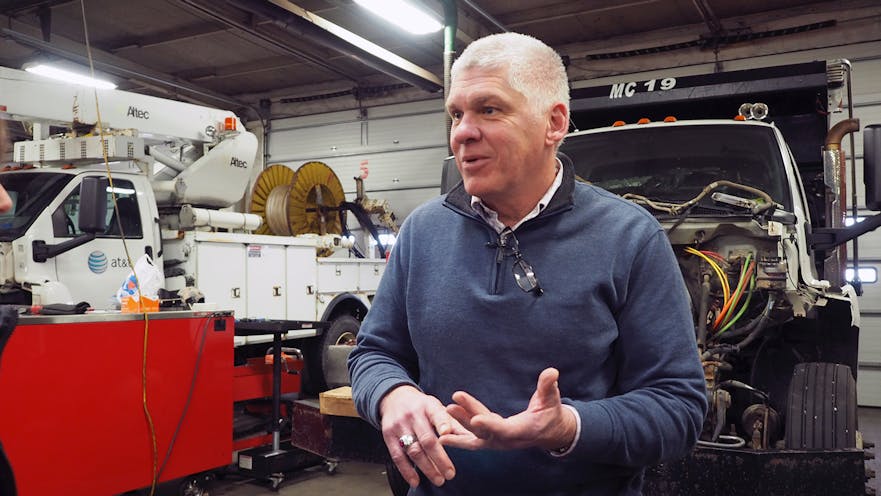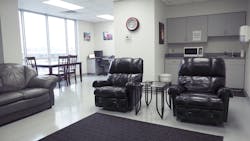LOUISVILLE. Nobody ever wants their truck to break down and need service, but if you have to, Kenworth of Louisville isn’t a bad place to do it. The dealership offers a well-thought-out, driver-focused service stop to come in out of the cold and snow of the kind that hit March 20-21, illustrating how truck dealers – just like fleets – are upping their game to accommodate drivers' needs.
The dealership, which was acquired by the Palmer Group in November, has placed a particular focus on drivers and customer service, and it shows. The facility here in Louisville caters to the owner-operator, independent driver market just as much as the fleet buyer. It’s got a customer lounge like a miniature, well-kept truck stop, where drivers waiting for their trucks to be repaired can sit back, relax on a leather sofa, watch DVDs, shower, catch a nap in a "quiet room", or even get some laundry done.
“The little things mean something to them,” noted John Yehl, general manager of Kenworth of Louisville. “They can do their laundry for free or take a shower for free rather than shower at the truck stop.”
That dedication and "knowing your customer" carries over to the way the trucks are showcased in the lot. Among the more fleet-centric and fuel-efficient T680s are the classic Kenworth W900 trucks, many of which are sold with manual transmissions, that are popular with many old-school drivers who want full driving control and a flat-front look.
“We cater to an owner-operator market here in Louisville, and the owner-operator market is still a little resistant to the newer aerodynamic T680,” Yehl explained. “They like the classic look of the W900. We stock some here, and we keep them here for those people.”
But no matter what they’re driving or hauling, drivers are looking for comfort. The W900s can be equipped with 86-in. "Studio" sleepers that help make the trucks feel a little more like home for drivers on the road. Another big concern for truckers is fuel economy; those looking for utmost fuel efficiency are going to look at more aerodynamic models like the T680, Yehl said.
Minimizing downtime is also a key factor at Kenworth. So when it comes down to servicing that truck and minimizing any time spent in the shop, Tom Kapitan, vice president of operations at Palmer Trucks, told Fleet Owner that one of the first things that happens in the shop is triage and communication as far as what's being done.
“When the truck comes in, within two hours, we triage the trucks,” he stressed. “We plug into the computer and download the fault codes and try to make a quick determination if we’re able to get that truck fixed fairly quickly, or if this is an ‘oh crud moment,’ where they are going to have to go in and repower the load and maybe do something different with their driver.”
“That’s really what [customers] are looking for,” Kapitan added. “They know these things are going to break down. They just need to know very quickly what to do with their load and their driver.”
In addition to triage, Kenworth’s TruckTechPlus remote diagnostic tool, which is now standard on all trucks, has become an invaluable part of the diagnostic process. Timely communication with the driver is also critical, during and after the repair.
“Don’t just hand the driver their keys and tell them it’s in slot 20,” Kapitan explained. “Take a few extra minutes and tell that driver what is going on so he or she knows you have addressed their concerns.”
In the end, nothing can keep those trucks on the road better than the technicians who service them. Here at Kenworth of Louisville they are living by the motto, “Service sells trucks.” In order to maintain its uptime goal of 95%, the dealership has been trying to "build" its own breed of technicians amid a growing employee shortage.
That means connecting with area tech schools and targeting diesel technicians at the high school level before those students go off to college and start racking up student loan debt. Kenworth also has a mentorship program in place and offers the needed tools to help techs starting out at the entry level eventually reach the level of master technician.
“We can’t run a truck dealership without these guys,” Yehl stressed. “You can sell as many trucks as you want, but it doesn’t matter if you can’t work on them.”
Ultimately, when it comes down to further expansion efforts and building its customer base down the road, both Yehl and Kapitan agree that it’s all about support.
“Everything is support after the sale,” Yehl said. “The sale is just the first part of this deal. It’s what we do after he gets his keys and drives away – whether it’s parts, service, information, training – that’s what builds a customer and brings a customer back the next time.”





